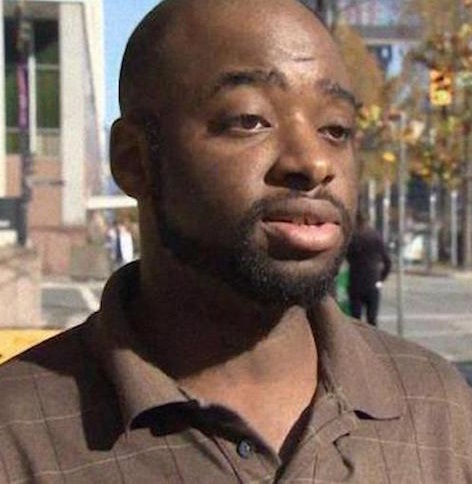Fear of United States police officers causes one Black man to seek asylum in Canada
By Breanna Caldwell
Associate Editor, Vol. 21
Kyle Lydell Canty is a 30-year-old Black male from the United States who has become so fearful that he will be killed by U.S. police officers because he is Black that he has applied for asylum in Canada on the basis of race.[1] Some might be tempted to claim that this is an extreme measure, but Canty’s fears of losing his life at the hands of a U.S. police officer are not unfounded.
Black people in the U.S. are three times more likely to be killed by law enforcement than white people.[2] Three times more likely. And, even more dishearteningly, unarmed Black men in the U.S. are seven times more likely to be killed by police gunfire than unarmed white men.[3] Let that sink in, then reconsider Canty’s decision to apply for asylum in Canada. In light of these statistics, does it really seem extreme or unreasonable for Canty to seek protection from our neighbors to the north?
To gain asylum from Canada’s Immigration and Refugee Board (“IRB”), Canty must prove that he is “someone with a well-founded fear of persecution in [his] country, based on race, religion, nationality, political opinion, or membership in a particular social group.”[4] To prove his case before Canada’s IRB, Canty presented evidence of Black males, such as Michael Brown and Eric Garner, being unjustly killed at the hands of the police.[5] He also presented evidence of his own history of police interactions — including minor altercations, misdemeanor criminal charges, and alleged false arrests — in order to establish a pattern of police harassment against him because of his race.[6]
The IRB is expected to make a decision on Canty’s case within the next few weeks.[7] It is unclear whether or not they will grant Canty’s asylum request. In a typical year, the IRB grants asylum to a maximum of 10 U.S. citizens.[8] That number could soon jump sharply if Canty’s claim were granted and similar asylum requests were filed and granted based on the precedent set in Canty’s case.
It should go without saying that even though it is understandable for Canty to seek asylum in Canada, asylum is not the solution. The fact that the situation in the U.S. is so bad that even one Black citizen feels like his only option for safety is to leave the country is an embarrassment to the United States.
The public and legal scrutiny of the police that has occurred in the wake of recent police killings of unarmed Black men needs to continue. The United States needs to start being honest with itself about racism and the systemic injustices that occur on a daily basis, and long-term systemic reforms to the criminal justice system need to be implemented. As outlined in a report from the Center for American Progress, changes that would kick-start the necessary reformation of the criminal justice system include:
- increased usage of special prosecutors in police misconduct investigations;
- enhanced collection of data on fatalities involving the police;
- implementation of implicit bias training for all federal law-enforcement officers and state and local police involved in federal task forces; and
- increased federal government oversight of police misconduct.[9]
However, it is important to note that these suggested reforms are not comprehensive. Racism and systemic injustices are deeply rooted and addressing the problem will require much more than these four changes. The road to reform will not be easy, but it is necessary and long overdue. It is not Canada’s job to make Black U.S. citizens feel safe; it is the job of the United States.
[1] Chad Pawson, Black U.S. citizen Kyle Lydell Canty seeks refugee status in Canada, CBC News (Oct. 23, 2015 5:37PM), available at http://www.cbc.ca/news/canada/british-columbia/black-u-s-citizen-kyle-lydell-canty-seeks-refugee-status-in-canada-1.3286707.
[2] Why do US police keep killing unarmed black men?, BBC News (May 26, 2015), available at http://www.bbc.com/news/world-us-canada-32740523.
[3] Sandhya Somashekhar et. al., Black and Unarmed, The Washington Post (Aug. 8, 2015), available at http://www.washingtonpost.com/sf/national/2015/08/08/black-and-unarmed/.
[4] Supra, note 1 (quoting Canada’s Immigration and Refugee Board spokesperson, Melissa Anderson).
[5] Mark Hansen, Black US citizen seeks refugee status in Canada on account of his race, ABA Journal (Oct. 27, 2015 5:30PM), available at http://www.abajournal.com/news/article/black_u.s._citizen_seeking_refugee_status_in_canada/?utm_source=maestro&utm_medium=email&utm_campaign=weekly_email.
[6] Supra, note 1.
[7] American citizen feels to Canada and asks for asylum because he thinks police in U.S. will kill him because he is black, DailyMail.com (Oct. 29, 2015), http://www.dailymail.co.uk/news/article-3295630/Black-man-fearing-US-police-kill-flees-Canada.html.
[8] Supra, note 1.
[9] Michele L. Jawando & Chelsea Parsons, 4 Ideas that Could Begin to Reform the Criminal Justice System and Improve Police-Community Relations, Center for American Progress (Dec. 18, 2014), available at https://www.americanprogress.org/issues/civil-liberties/report/2014/12/18/103578/4-ideas-that-could-begin-to-reform-the-criminal-justice-system-and-improve-police-community-relations/.

